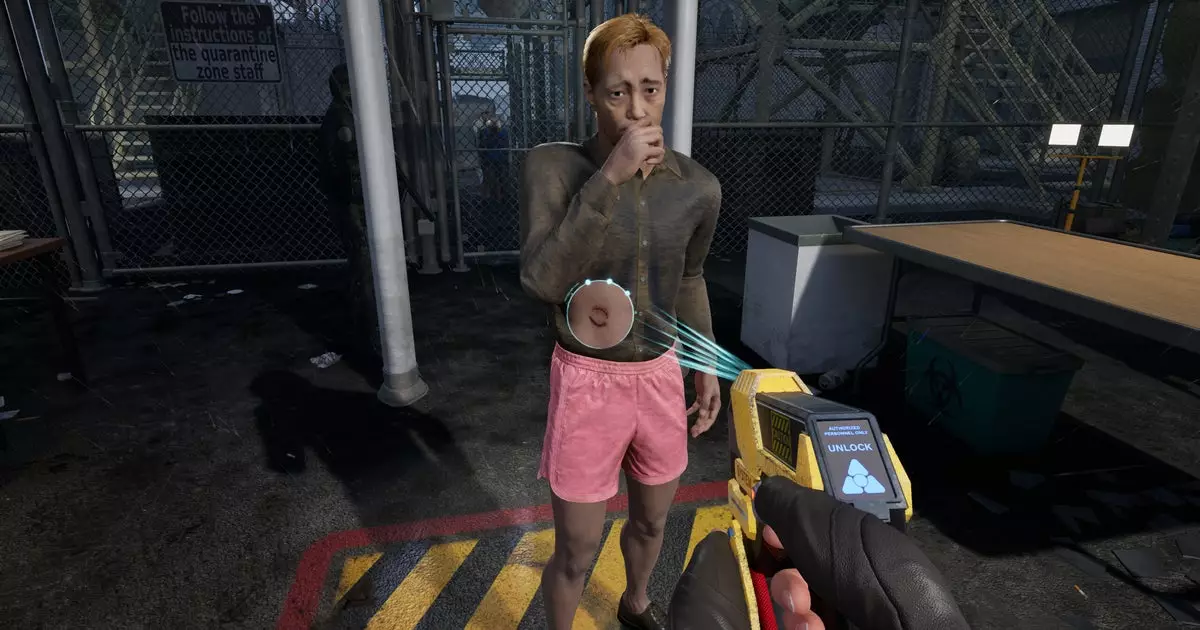Quarantine Zone: The Last Check introduces players to a tense, morally complex universe where authority is everything, and every decision bears weight. Unlike traditional zombie survival games that focus solely on combat or resource scarcity, this title emphasizes psychological pressure and ethical ambiguity. As a government official clad in hazmat gear, players occupy a role that combines the tension of border control with the suspense of a social experiment. The core premise—isolating threats without becoming one—forces players to navigate fine lines between safety, compassion, and authoritarian control.
This game’s mechanics challenge players to scrutinize every refugee through an array of inspection tools, creating a palpable sense of paranoia. Judging whether a person is a potential carrier or simply suffering from mundane ailments calls for careful observation, critical thinking, and swift judgment. This layered approach elevates Quarantine Zone beyond mere zombie slaughter, transforming it into a simulation that probes deeper questions about trust, fear, and the human cost of survival policies. It confronts players with uncomfortable choices, often making them wonder whether compassion or suspicion is the more justified response under mounting pressure.
Resourcefulness and Risk: The Heart of Strategic Play
One of the most compelling aspects of Quarantine Zone is its resource management system. Limitations on medical supplies, testing kits, and personnel add an urgency that makes every decision critical. Do you quarantine a sick individual and risk depleting vital resources, or do you release them and gamble with the potential contagion? The game smartly rewards strategic foresight and punishes impulsivity, prompting players to think multiple steps ahead.
Moreover, the dynamic wave of threats—ranging from innocent civilians to imminent zombie outbreaks—creates a pulse-pounding atmosphere. The challenge lies in balancing the day-to-day responsibilities of checkpoint supervision with the mounting threat of full-scale zombie invasions. As nights fall, defenses must be erected and personnel deployed, turning the game into a multi-layered experience that combines micro-management with macro-level crisis response. The unpredictability of each incoming queue keeps players on edge, and the fear of making a fatal mistake intensifies the immersion.
Is the Game a Reflection or a Parody?
While the mechanics appear engaging and the premise compelling, there is room for skepticism regarding the game’s thematic depth. Some critics could interpret Quarantine Zone as a satire of real-world border politics, highlighting the absurdity and cruelty embedded within insular policies. Others might see it as a straightforward dystopian narrative, emphasizing the horrors of unchecked governmental power during crises.
Interestingly, the game hints at an absurdist humor element—imagine trying to determine whether a zombie is a disguised Buster Keaton or a dinosaur named Barney. This satirical twist underscores the game’s willingness to poke fun at paranoia and bureaucratic absurdity. Playing with such whimsical scenarios invites players to question the seriousness often associated with survival horror, suggesting that perhaps the real monsters are the bureaucratic mechanisms and overzealous suspicion, not the undead themselves.
The Power of Choice and the Burden of Morality
Ultimately, Quarantine Zone demands that players confront uncomfortable moral dilemmas. Every decision—whether to admit a suspicious individual, quarantine the healthy out of caution, or eliminate perceived threats—becomes a weighing of life, safety, and ethics. The game’s design seems to argue that in a crisis, moral clarity gives way to survival instincts, and the line between right and wrong blurs dangerously.
Moreover, the game’s progression mechanics reinforce the idea that persistent fear and security measures can corrupt or desensitize individuals. Each passing day in the quarantine zone leaves an imprint on your virtual conscience, challenging players to reflect on what kind of authority they wish to embody. Are they cautious protectors, dismissive racists, or perhaps something darker? Quarantine Zone’s layered narrative and gameplay serve as a mirror, reflecting the often uncomfortable truths about societal responses to crises.
In a landscape saturated with zombie-themed titles, Quarantine Zone distinguishes itself through its focus on psychological tension, moral ambiguity, and strategic depth. It demands more than reflexes; it asks players to critique their own instincts, ethics, and perceptions of safety. Whether it ultimately offers insightful commentary or just a satirical spin on familiar tropes remains to be seen, but its emphasis on choice and consequence ensures it will provoke thought long after the game is turned off.


Leave a Reply